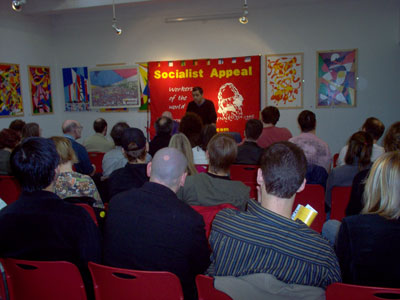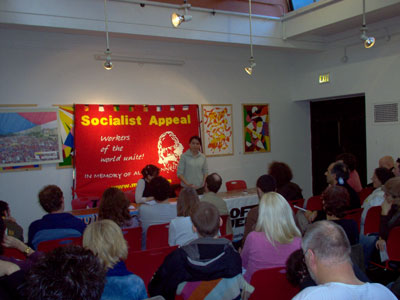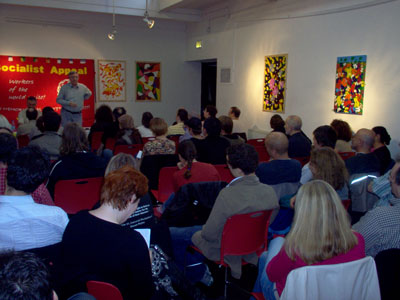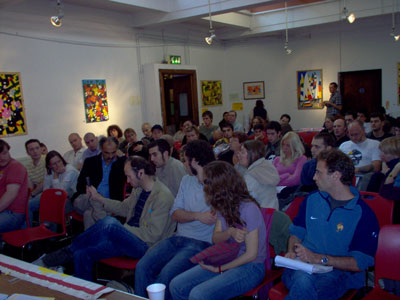On Saturday, nearly 80 people filled a hall in Central London to attend the Marxist.com day school on the Latin American revolution. The audience was mostly young and new to the ideas of marxist.com. This is an indication that our ideas and material on the Latin American revolution, and the Venezuelan revolution in particular, are attracting a new layer of workers and youth. This bodes well for the future.
The first session was on the Cuban Revolution and was introduced by Fred Weston. Fred outlined the background to the revolution. He explained the conditions that existed in Cuba before the coming to power of Castro and compared them to what was achieved after the revolution in terms of healthcare, education, life expectancy and so on.
 He explained that initially the leaders of the guerrilla army were aiming to carry out reforms within the confines of capitalism. They wanted reforms, a democratic constitution, parliament and so on. But in attempting to achieve this they came up against the limits of capitalism. Even the reforms that they were trying to carry out could not be tolerated by the imperialists. Thus they came into direct conflict with the US bourgeoisie. In this conflict Castro went all the way and expropriated those companies that would not cooperate with his reform programme. Thus he found himself nationalising 90% of the productive forces. He had in fact abolished capitalism.
He explained that initially the leaders of the guerrilla army were aiming to carry out reforms within the confines of capitalism. They wanted reforms, a democratic constitution, parliament and so on. But in attempting to achieve this they came up against the limits of capitalism. Even the reforms that they were trying to carry out could not be tolerated by the imperialists. Thus they came into direct conflict with the US bourgeoisie. In this conflict Castro went all the way and expropriated those companies that would not cooperate with his reform programme. Thus he found himself nationalising 90% of the productive forces. He had in fact abolished capitalism.
Basing himself on these events, Fred pointed out that this confirmed Trotsky’s theory of Permanent Revolution. In an underdeveloped country, as Cuba was in 1959, no serious reform was possible without breaking with capitalism. Although in a distorted form, what happened in Cuba was precisely this.
Fred stressed that it is the duty of Socialist, Communists, Marxists, to defend the Cuban Revolution, but also explained that the only way of defending it is to expand the revolution across the whole of Latin America and beyond. If socialism could not be built within the borders of a powerful but isolated Russia, with all its resources, how can it be built on a small Caribbean island surrounded by capitalist regimes?
The discussion that followed centred on how the isolation of the Cuban Revolution could be broken and what was the way forward. There were some sectarians present who called for a political revolution to overthrow Castro. They spoke in the abstract without really looking at the real situation on the ground. Speakers answered this false position, explaining that Castro, despite any limitations, was opposed to the restoration of capitalism.
To advocate the overthrow of Castro today would mean the victory of the counter-revolution. All those who advocated such an ultra-left position from afar would be regarded by the majority of Cubans as agents of American imperialism. The vast majority of the audience at the school supported the case for reform in Cuba, and the need to extend the revolution to the rest of Latin America as the only real way forward.
In summing up Fred pointed out that what we say to the Cuban masses, and in particular to the genuine Communists in Cuba, is that the party should adopt the positions of Lenin and Trotsky. It should introduce workers’ democracy, workers’ control and management and genuine soviets, i.e. workers’ councils. It should base itself on the Cuban masses and at the same time spread the revolution to the rest of Latin America, and he also explained how the fate of Cuba is inextricably linked to the success or failure of the revolution in Venezuela, Bolivia, Colombia and so on.
The second session was on the revolution in Bolivia, and was introduced by Amancay of the Bolivia Solidarity Campaign. She began by explaining the history of the “Water Wars” and the struggle against the privatisation of water which began in the late 1990s.
 She also explained the background to the massive battles over nationalisation of the hydrocarbons, which have thrown Bolivia into revolutionary ferment. Many questions from the floor were focussed on the events in May and June of this year when Bolivia was gripped by a revolutionary general strike. Comrades from the floor asked how the latent power and revolutionary instincts of the Bolivian working class could be channelled towards the seizure of power, and how the movement could avoid setbacks such as they suffered earlier this year. This led to a general discussion on the revolutionary movement in Bolivia, and the lack of revolutionary leadership and a party that could have led the movement to power in May and June.
She also explained the background to the massive battles over nationalisation of the hydrocarbons, which have thrown Bolivia into revolutionary ferment. Many questions from the floor were focussed on the events in May and June of this year when Bolivia was gripped by a revolutionary general strike. Comrades from the floor asked how the latent power and revolutionary instincts of the Bolivian working class could be channelled towards the seizure of power, and how the movement could avoid setbacks such as they suffered earlier this year. This led to a general discussion on the revolutionary movement in Bolivia, and the lack of revolutionary leadership and a party that could have led the movement to power in May and June.
The final session was on Hugo Chavez and the Venezuelan Revolution. This was introduced by Alan Woods, the editor of Marxist.com and author of The Venezuelan Revolution. Alan began with an overview of the world situation which is characterised by enormous volatility and instability. This arises from the impasse of the capitalist system, which like the social systems of the past, has experienced a progressive phase, but is now in its phase of decay and decline. This is most graphically expressed in the crisis afflicting the whole of Latin America, where there is not a single stable regime.
The Bolivarian revolution is an expression of this revolutionary tide sweeping the region, which has affected Ecuador, Argentina and now Bolivia and Venezuela. The crisis of the old regime was graphically revealed after the massacre of February 1989 where thousands were killed in the Caracazo. This uprising was in response to the doubling of transport costs and the austerity programme introduced by President Perez. It was out of the revulsion at this massacre that Hugo Chavez organised an opposition within the armed forces, and launched a coup in 1992.
 The ousting of Perez led to the amnesty of Chavez, who had by then realised that a movement must be built on the masses themselves. It was then that the Bolivarian movement was formed and Chavez was swept into the presidency in 1998.
The ousting of Perez led to the amnesty of Chavez, who had by then realised that a movement must be built on the masses themselves. It was then that the Bolivarian movement was formed and Chavez was swept into the presidency in 1998.
The victory of Chavez shattered the bourgeois parties. It opened the floodgates for a mass revolutionary movement. While Chavez has attempted to carry out his programme within the confines of capitalism, it is proving to be more and more impossible. The Venezuelan oligarchy and the imperialists are opposed to Chavez and are determined to overthrow him.
Through his experience, Chavez has moved from his earlier positions and has came to realise that only the overthrow of capitalism could offer a solution, not only in Venezuela, but throughout the world. “People change!” explained Alan, and repeated the point. Chavez is not a Marxist, but has taken a courageous stand against imperialism and the oligarchy. He has learned through experience. He has come to the conclusion that socialism is the way forward.
A few sectarians in the audience raised their criticisms of Chavez, but as always, their criticisms lacked a sense of proportion. They dedicated a few sentences to say they defended the revolution, then the rest of their contributions concentrated on criticising. They could not see the wood for the trees. They concentrated on the limitations of Chavez, but could not see the real nature of the movement that he rests on.
 Contributions from the floor highlighted the role of Chavez. His coming to power and his determination have been an important contribution in pushing forward the Venezuelan revolution. But of course the revolution is not complete. It cannot stand midway. It either moves to complete the process by nationalising the commanding heights of the economy and thus smashing the power of the oligarchy, or in the long run the whole process can unravel and the oligarchy can re-establish its control over society.
Contributions from the floor highlighted the role of Chavez. His coming to power and his determination have been an important contribution in pushing forward the Venezuelan revolution. But of course the revolution is not complete. It cannot stand midway. It either moves to complete the process by nationalising the commanding heights of the economy and thus smashing the power of the oligarchy, or in the long run the whole process can unravel and the oligarchy can re-establish its control over society.
All of those present, bar a handful of sectarians, were pleased with the day’s discussions. Many expressed the desire to get more involved with the activities of Marxist.com and asked for material to use in their areas and spread the ideas of Marxism.
There was also Latin American food made available for those taking part in the school. This was followed by a successful social in the evening. Nearly everyone who attended thought it had been a great day. It shows how attractive the ideas of Marxism are. Clearly, the success of this school means that plans have to be made for more such schools in the future.
October 31, 2005
